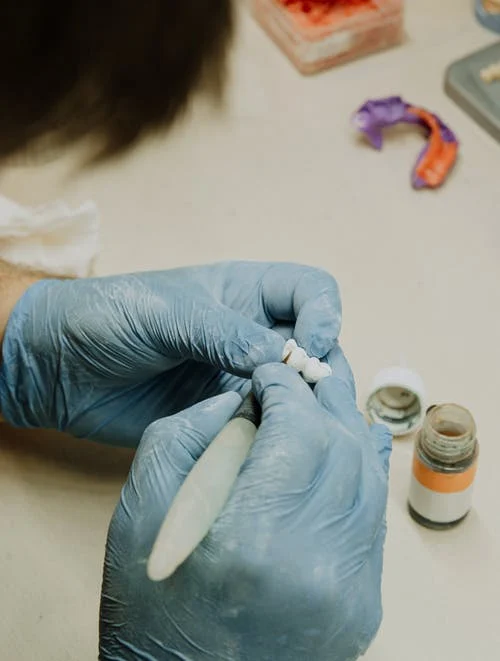 Dental implants are a prosthetic solution for people with weak or damaged teeth due to disease, trauma, or a congenital disability. Patients leaving their mouth without teeth for some time run the risk of gums receding from the bone and creating an unnatural-looking smile. Dental implants function as props to hold dentures in place and stimulate the jaw bone to begin remodeling itself into the form of the missing teeth. They also make it possible to put their best smile forward again, no matter their oral health status. They can resume their regular eating habits without facing any chewing difficulty.
Dental implants are a prosthetic solution for people with weak or damaged teeth due to disease, trauma, or a congenital disability. Patients leaving their mouth without teeth for some time run the risk of gums receding from the bone and creating an unnatural-looking smile. Dental implants function as props to hold dentures in place and stimulate the jaw bone to begin remodeling itself into the form of the missing teeth. They also make it possible to put their best smile forward again, no matter their oral health status. They can resume their regular eating habits without facing any chewing difficulty.
What should you do if you have missing teeth problem?
Before considering dental implants, you can educate yourself a bit about this treatment procedure a bit through Rockville Dental Arts Blog or some other credible source. At the same time, you need to meet your dentist to discuss whether they are right for you. The process generally includes an examination of your teeth and gums to look for any signs of damage or decay. X-rays and CT scans can also check the bone density and its ability to anchor your implants and that the mouth is ready to accommodate these additions adequately.
Depending on what your dentist will tell you, the process can last anywhere between a few months to over a year, and if you need more than one surgery, this may lengthen the process further. They can administer local anesthesia during the procedure, or sedation dentistry might also feature if necessary. Dental implants aren’t cheap either, so make sure you ask about the costs for each stage of treatment and the total cost of your dental implant.
Anyway, before the treatment begins, your doctor can ask you to stay away from smoking or any such habit damaging your dental health.
How much time does it take for recovery?
There is a high success rate with dental implants in general if you follow the doctor’s orders. If you don’t take care of your overall wellbeing and keep up with rigorous dental habits, though, your chances of maintaining stable oral health diminish as well. So essentially, if you’re diligent in practicing good oral hygiene habits after a procedure and regularly go in for follow-up appointments with your dentist, you will be well on your way to maintaining long-term oral health.
After surgery, you may experience minimal discomfort, for which you have to take over-the-counter medication that your dentist will prescribe. Your face and gum can swell a bit, and the implant site can also face bleeding issues a little. It’s important to rest after surgery to alleviate these risks. Also, you may have to eat soft foods for a while. You might still have some pain in the first few days following the surgery, but this should decrease over time if it doesn’t go away entirely.
Many people choose a dental implant to eliminate the missing tooth problem and other ensuing oral health challenges. If you lost your teeth due to decay or some injury, you could consider this treatment to restore your mouth’s functioning.

